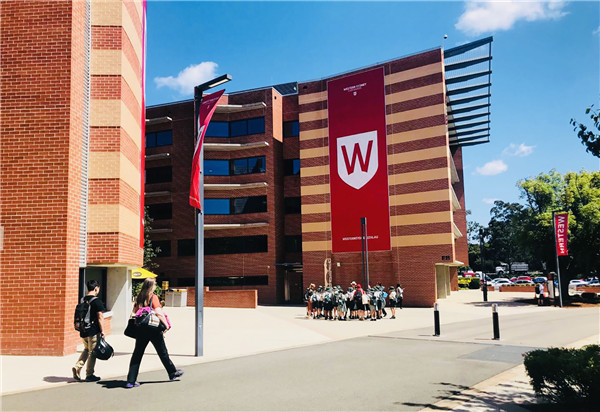我在中国与汉语的美丽邂逅
[ 澳大利亚 ] 何睿智 西悉尼大学

我的中文名字叫何睿智,意思就是我是多么的聪明智慧。多么的高大上啊!我很喜欢我的中文名字。
我很喜欢汉语的成语和俗语,比如“天下一家”,意思是天下人为一家。人类的沟通,首先是语言的沟通与交流。一家人不说两家话,要说就说中国话!所以,上大学后我决定学习汉语。我们都知道汉语很难学,但是我喜欢挑战。学习的过程中,我体验到了学习汉语的苦辣酸甜,同时也感受到了学习汉语的乐趣。在中国期间,我也有许多美好的邂逅和回忆。
汉语是有声调的语言,声调不同,意思就不一样。比如,有一次,在北京我问路。我问路人甲:“美女,我可以问你一下吗?”那位美女脸红了,没理我。我以为她没听清楚,就又问:“美女,我可以再问你一下吗?”美女狠狠地瞪了我一眼,走了,弄得我莫名其妙。后来我才知道,“问”是第四声,但是,如果我的声调错了,发成了第三声,就成了“我可以吻你一下吗?”怎么能随便亲吻别人呢?!我后悔莫及,学好汉语太重要了!
我刚到中国的时候,使用频率最高的一个词是“这个”,因为那么多中文词语很难记住。在商店我要买一条围巾,我就指向一条围巾对售货员说“这个”。我很喜欢吃“蒜蓉粉丝蒸虾”,可是在饭馆我怎么也说不出来,就指着菜单上的图片说“这个”,不一会儿,“这个”菜就上桌了,我就可以大快朵颐了。不过也闹过笑话,有次我跟我的一个“老外”朋友去饭馆吃饭,他的中文比我还烂。点菜时他有点儿“尴尬”,我说没事儿,我会点菜,我知道点菜的窍门儿!我说:“服务员,这个……,我要两个……这个!谢谢。”服务员笑了,问我:“真的吗?这个……很辣呀。”可惜“这个”我听懂了,“很辣”我还听不懂,就自信十足地微笑着连连点头。“如果你点这个,你可能会后悔一辈子的。”我依然点头傻笑着。“这个”菜终于上桌了,一口下去,辣得我面红耳赤,一会儿就汗流浃背了。可是我又得若无其事地假装这就是我的“菜”,让人感觉“这个”辣得我很舒服,还可以再辣一点!厨房门后,厨师偷看着我,一个个笑得乐不可支。不过后来我越来越喜欢“辣”文化了。俗话说,南甜北咸东辣西酸。我知道四川人、湖南人和湖北人最爱吃辣椒。四川人“不怕辣”,湖南人“辣不怕”,湖北人“怕不辣”。我喜欢吃辣的,我也喜欢“辣妹子”!

西悉尼大学 / 何睿智提供
我还学会了砍价。首先,你要对汉语的数字有了熟悉的掌握才能砍起价来得心应手。不管是瞒天过海、漫天要价,我都稳如泰山、沉着应付。几个回合下来,不到半价我就拿到手。有一次,我问商店的老板这个多少钱?他笑脸相迎地说“二百五”,我当即笑呵呵地回应:“你才二百五呢!”老板一开心,给了我一个甩卖价!
您仔细看看数一数,我上边用了多少个汉语的成语和俗语呢?世上无难事,只要肯登攀!有志者事竟成!期待着有一天我能做中澳文化交流的使者。
邂逅汉语,邂逅中国,是我人生中最美丽的邂逅!
My Beautiful Encounter with Chinese Language in China
[Australia] Hamish Spark, Western Sydney University
My Chinese name is He Ruizhi, which literally means how wise and smart I am. How great it is! I like my Chinese name.
I like Chinese idioms and proverbs, such as tianxiayijia, which means the world is one family. Human communication mainly depends on the lingual communication and exchange. If the world is going to speak one language, let’s speak Chinese only. I decided to learn Chinese after entering the university. Everyone knows that Chinese language is very difficult to learn, however, I love challenges. I have experienced sweetness, bitterness and struggling of learning Chinese. There are lots of fun in learning Chinese and beautiful encounters and memories during my stay in China.
Chinese is a language with four tones. The same pronunciation with different tones may mean differently. Awkwardness happens if we use wrong tones. I once asked for directions in Beijing. I asked a girl passing by me, “Hi, fair lady, wo keyi wen ni ma? (will you do me a favour?)” The girl flushed and ignored me. I did not know why and thought she did not hear me clearly. I repeated, “Fair Lady, wo keyi wen ni ma?” The girl stared at me fiercely and walked away. I was confused. Later, I realized that I used the wrong tone. When wen in the fourth tone it means ask; however, when I was asking for a favour, I pronounced it in the third tone, which means kiss. Therefore, when I was asking for a favour for directions, because of the wrong tone used, it turned into “Can I kiss you?” It’s so important to learn Chinese well!
When I first came to China, one of the words I used most frequently was zhege (means “this one”). There were too many Chinese words, and I could only say zhege to express myself. For example, I came to a shop for a scarf. I pointed to one scarf and said to the shop assistant, “zhege.” It would soon be taken to my hands. I especially love a dish called “garlic shrimps with thin noodles”, however I did not know how to say it in restaurants. Therefore I would find the picture on the menu and said, “zhege.” It would be served very soon and I then could enjoy it with gratification. There were awkward moments too. I once went to a restaurant with one of my foreigner friends whose Chinese was even worse than mine. He was very awkward when we were going to order dishes. I told him it was fine because I knew how to order dishes with my clever tricks. I said to the waiter, “zhege, two, thanks.” The waiter smiled and asked, “Do you mean it? zhege, em, henla (very spicy).” I knew what “zhege” meant, however, I did not know what he meant by henla. I pretended that I knew what I ordered and nodded with confidence and smile. The waiter said, “You might regret this in your whole life if you order this.” I still smiled like an idiot and kept nodding. The dish was finally served to our table. Only one bite made my face red and I sweated immediately. However I had to pretend that this was my dish and I wanted people to know that I loved this spicy dish and it could be more spicy. The chef peeked at me behind the kitchen door and could not stop laughing. However I now came to love the “spicy” culture more and more. An old Chinese saying goes that “sweet south, salty north, spicy east and sour west”. I know that people in Sichuan, Hubei and Hunan provinces love peppers a lot. People in Sichuan do not fear spicy food, those in Hunan fear not a least any spicy food, while those in Hubei fear that their food are not spicy enough. Now I love both spicy food and also “hot girls” (In Chinese, la can be used to describe both spicy food and hot girls).
I also learned how to bargain. You need first get yourself familiar with Chinese numbers before you can bargain well. No matter how adept sellers are at quoting, I keep cool and composed. After several rounds of back-and-forth bargaining, I usually can get what I wanted at a half of the original price. I once asked a shop keeper how much this was. He smiled and said, “250 (It is a number used to tease people in Chinese).” I smiled back and responded, “You are 250!” the shop keeper was amused by my reply and agreed a very low price.
If you are careful enough, please tell me how many Chinese idioms I have used in this article. Where there is a will there is a way. Nothing is impossible to a willing mind! I look forward to be an envoy for China-Australia diplomatic and cultural exchanges.
Encountering Chinese and China are the most beautiful encounters in my life.



